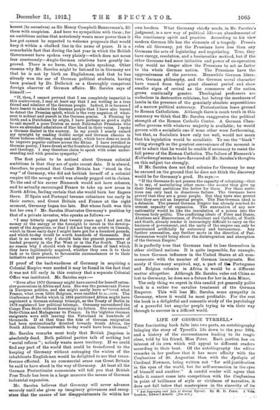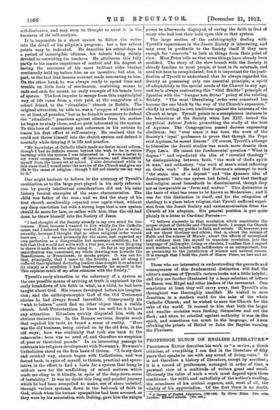LIFE OF GEORGE TYRRELL.•
Tins fascinating book falls into two parts, an autobiography bringing the story of Tyrrell's life down to the year 1884, and a history of the circumstances leading to its tragic close, told by his friend, Miss Petre. Each portion has an interest of its own which will appeal to different readers according to their bent. Of the autobiography the editor remarks in her preface that it has more affinity with the Confessions of St. Augustine than with the Apologia of Cardinal Newman, being written not "for self-justification in the eyes of the world, but for self-accusation in the eyes of himself and another." A candid reader will agree that while it cannot come into competition with the Confessions in point of brilliance of style or vividness of narrative, it does not fall below that masterpiece in the sincerity of its • Aut.biography rued Life of George Tyree,. By M. D. Petra 2 Yalta London; Edward Arnold. [21s. nat.)
self-disclosure, and may even be thought to excel it in the keenness of its self-analysis.
It is impossible in a short review to follow the writer into the detail of his pilgrim's progress ; but a few salient points may be indicated. He describes his school-days as a period of incorrigible idleness, his talents being mainly devoted to outwitting his teachers. He attributes this folly partly to his innate impatience of control and his disgust at having the successes of his more brilliant elder brother continually held up before him as an incentive, but also, in part, to the fact that lessons were not made interesting to him. On the other hand, he was always ready to spend time and trouble on little feats of mechanism, contriving means to ends and ends for means, an early example of his innate lore of system. The first impulse to escape from this unpeincipled way of life came from a visit paid, at the suggestion of a
school friend, to the "ritualistic" church in Dublin. The original attraction, be tells us, was a "soupcon of wickedness
or, at least, of paradox," but as be found it necessary to defend the "ritualistic" practices against attacks from his mother he began to study them, and so grew interested in the system.
To this love of consistency and coherence in his notions he traces his first effort at self-mastery. He realised that he could not throw himself into the church system and defend it mentally while denying it in life and practice.
"My knowledge of Catholic ideals made me desire moral reform, though I had no definite reason beyond the wish to be in entire harmony with the system I was interested in. I wrote a letter to my worst companion, breaking off intercourse, and dissociated myself from the looser set at school. I also determined while in this state that I would enter the service of the Church and give my life to the cause of religion: though I did not clearly see my way to it."
One might hesitate to believe in the accuracy of Tyrrell's recollection as to the large part played in his early reforma- tion by purely intellectual considerations did not his later history furnish examples of the same characteristics. The child was father of the man ; and we find the story of his first church membership repeated over again when, without any deep conviction but with a strong hope that a new system should do more for him, or rather with him, than the old had done, he threw himself into the Society of Jesus.
"I had thought of the Society already in my own mind for two reasons. First, because I wanted to live wholly for the Catholic cause, and I believed the Society worked for it, per fas et nefas ; secondly, because I thought that no other religious order would have me.. . . I eared primarily for the cause, and regarded my own perfection as a disagreeable but necessary condition ; for I felt that God would not write with a foul pen, even were He going to throw it aside for ever after using it. ... So far as my personal sanctification was concerned, my whole drawing was towards the Benedictines, or Franciscans, or monks proper. It was not for that, principally, that I came to the Society ; and all along I suffered their spiritual doctoring (rather than sought it or admired it) simply as a condition I had inadvertently let myself in for. This explains much of my after relations with the Society."
Tyrrell's early attraction to the coherency of a system as the' one possible means of arriving at truth is explained by the early breakdown of his faith in what, as a child, he had been taught about God. His reason developed before his imagina- tion; and the anthropomorphic God of the Old Testament stories he had always found incredible. Consequently his "wish to believe" could find no other object than a visible church. Irish Protestantism he knew too well for it to have any attraction. Ritualism quickly disgusted him with its obvious insincerities. In the Roman services, despite much that repelled his taste, he found a sense of reality. "Here was the old business, being carried on by the old firm, in the old ways ; here was continuity that took one back to the catacombs ; here was no need of, and therefore no suspicion of, pose or theatrical parade." In an interesting passage he contrasts his religions development with Newman's. Newman's Catholicism stood on the firm basis of theism. "I, in my dark and crooked way, almost began with Catholicism, and was forced back, in spite of myself, to theism, practical and specu- lative, in the effort to find a basis for a system that hung 'in mid-air save for the scaffolding of mixed motives which made me cling to it blindly, in spite of the deep-down sense of instability." It was no doubt this long and painful journey which he bad been compelled to make, out of sheer unbelief, through various systems, down to the bed-rock of faith in God, which when his human sympathies had been aroused, as they were by his association with Dolling, gave him the unique power he afterwards displayed, of saving the faith in God of many who had lost their hold upon this or that system.
The large section of the autobiography dealing with Tyrrell's experiences in the Jesuit Society is interesting, and
may even be profitable to the Society itself if they care enough for "converts" to look at things from their point of view. Miss Petre tells us that some things have already been modified. The story of the slow breach with the Society is
already familiar to most people, at least in its externals, and need not here be recapitulated; bait is important for the justi- fication of Tyrrell to understand that he always regarded the Society as possessing only one essential principle, a spirit of adaptability to the special needs of the Church in any age, and he is always contrasting this "vital flexible" principle of, Ignatius with the " frangar non fleeter" policy of the existing Society. " The most 'liberalizing' order ever conceived has, become the one block in the way of the Church's expansion," chiefly by setting its own traditions against the interests of the Church at large. Tyrrell points to a conspicuous instance in the behaviour of the Society when Leo %ILL issued the encyclical deter ni Faith, prescribing the study of the text
of Aquinas. The Congregation passed decrees expressing obedience; but "ever since- it has been the work of the Society's ' loyal' professors to prove that though the Pope•
said Aquinas, he meant Snares." Of course, Tyrrell's attempt to liberalize the Jesuit studies was much more drastic than Pope Leo's. He raised the fundamental question " What is dogma F " and repudiated the idea of " revealed theology" by distinguishing between faith, " the work of God's spirit
in man," and orthodoxy, "the work of man's mind reflecting- on God's work." He held that Newman's attempt to work
"the static idea of a deposit" and "the dynamic idea of development" into one system had failed ; and that theobgy and religion must henceforth be discriminated, though they are as inseparable as "form and matter." This distinction is the basis of what has come to be known as Modernism ; and it was for this distinction in itself, and for the relegation of theology to a place below religion, that Tyrrell suffered expul- sion from the Jesuit Society and excommunication from the Church of his adoption. His general position is put quite plainly in a letter to Cardinal Perratal—.
"I believe sincerely in that revelation which constitutes the proper object of Catholic and Christian faith. I accept the Church and her saints as my guides in faith and morals. If, however, yen• ask me about theology and ethics; that is, about the science of Faith and the science of Morals ; about the efforts of uninspired and ordinary men like myself to translate revelation into the language of philosophy, living or obsolete, I confess that I regard such matters, not indeed with indifference or as unimportant, but as pertaining to the jurisdiction of science and natural reason. Itis enough that I hold the faith of Simon Peter, no less and no more."
Those who are interested in understanding the grounds and consequences of this fundamental distinction will find the' editor's analyses of Tyrrell's various books not a little helpful ;
and they are further illustrated by a large selection of letters' to Baron von Hiigel and other leaders of the movement. One conviction at least they will carry away, that Tyrrell's aim throughout was thoroughly unselfish. He wished to save. Jesuitism in a modern world for the sake of the whole Catholic Church; and he wished to save the Church for the sake of the world. It seemed to him that both the larger and smaller societies were feeding themselves and not the
flock ; and when he rebelled against authority it was ;in the
spirit, and sometimes too much in the language, of Amos rebuking the priests of Bethel or John the Baptist warning the Pharisees.











































 Previous page
Previous page